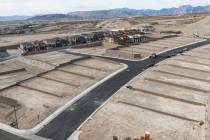Court to tweak rules of Foreclosure Mediation Program
With more than 80,000 Nevada properties in some stage of foreclosure, the Nevada Supreme Court for the fifth time in 16 months will tweak the rules of its mediation program, which is intended to bring borrowers and lenders together.
The public is encouraged to attend a hearing to discuss potential amendments to the Foreclosure Mediation Program at 2 p.m. Dec. 6.
"With the Foreclosure Mediation Program now in its second year of operation, we have determined that some additional rule changes would make the process more efficient and responsive, to benefit both the homeowner and lender," Justice Mark Gibbons said in an e-mail. "Issues always arise in programs that are as complex and far reaching (as the program)."
Lawmakers tasked the high court with creating and running the program in 2009 after the housing bubble popped, threatening home loss for tens of thousands of Nevadans. The problem was exacerbated when the economy tanked and thousands more lost their jobs. Nevada now leads the nation in per capita foreclosures.
Since July 2009, when the program went into effect, thousands of homeowners have been allowed to remain in their homes — and thousands more have voluntarily relinquished property — but issues continue to pop up.
Most recently, Las Vegas attorney Jacob Hafter unsuccessfully tried to have Judge Donald Mosley disqualified from any judicial reviews of failed mediations, arguing Mosley is biased because he has said that neither he nor Washoe County Judge Patrick Flanagan would ever sanction a lender who acts in bad faith by modifying a loan from the bench.
Chief District Judge Arthur Ritchie said the case is "ripe" for the Supreme Court to hear, but no appeal has yet been filed.
There also have been problems with lenders failing to provide the necessary paperwork or a person authorized to negotiate at mediations. But the rule changes slated for discussion Dec. 6 address other issues that have cropped up since the innovative program went live 16 months ago and involve mainly the scores of mediators working thousands of foreclosures.
The proposed rule changes include expanding control over mediators; better defining the conflicts that merit their disqualification; and better defining the financial entities eligible to participate.
In an effort to enhance efficiency, one rule will require parties to notify the program if an agreement is reached outside of mediation.
One rule change will bar non-attorneys who obtain power of attorney from receiving compensation to represent a distressed homeowner — likely a response to a growing number of foreclosure scams in Nevada and elsewhere. Another proposed rule would modify rules on document exchanges; and yet another would require a firm move-out date in any agreement to relinquish a home.
Finally, foreclosures mediation costs, now set at $400, could increase with the proposed adoption of a fee schedule that takes into account the amount of work the mediator does.
Chief Justice Ron Parraguirre hinted in an e-mail that the rule changes were expected. "We always anticipated that periodic rule changes would be necessary," he said. "The goal of the Supreme Court is to make sure the program works for those who need it — both homeowners and lenders."
Contact Doug McMurdo at dmcmurdo@reviewjournal.com or 702-224-5512 or read more courts coverage at lvlegalnews.com.


















